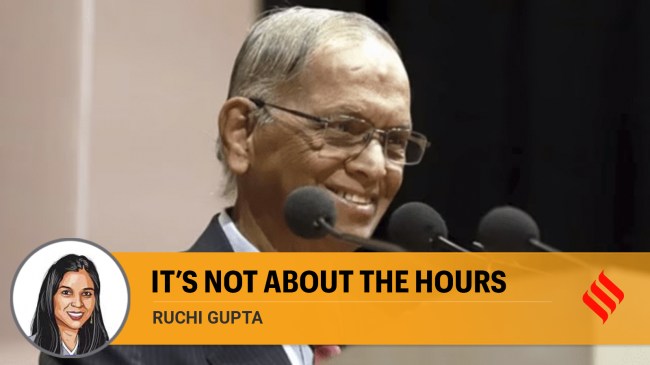Opinion Narayana Murthy and 70-hour work week: A narrow idea of nation-building
What is required is to foster a sense of national purpose and a visible attempt by our top 10 per cent to give to our country and move everyone forward
 Yes, India needs to improve its productivity and we may need a cultural shift towards discipline. But equally, we need corporate India to have a sharper sense of its responsibility towards our country. (Express photo by Pavan Khengre/File)
Yes, India needs to improve its productivity and we may need a cultural shift towards discipline. But equally, we need corporate India to have a sharper sense of its responsibility towards our country. (Express photo by Pavan Khengre/File)
Infosys founder Narayana Murthy touched off a debate when he advocated longer work hours for India’s youth. He argued that “India’s work productivity is one of the lowest in the world […] so therefore, my request is that our youngsters must say, ‘This is my country. I’d like to work 70 hours a week’.” A sense of ownership and commitment to one’s country is indeed a sentiment worth inculcating in our young and old alike. However, two questions arise: Have we done enough to facilitate a sense of shared destiny at a national level necessary to inculcate this ownership? And, what does it mean for a young person to contribute to nation-building?
On the first question, we are arguably falling short. The lives and views of the top 10 per cent dominate our popular culture — the lived reality for a vast number of young people diverges at birth from these aspirational narratives. Segregation based on class and other markers of social capital are rigidly maintained and it is difficult to think of egalitarian spaces where people mingle as relative equals across these divides. It is also not evident that there’s a readily available path to socio-economic mobility.
As per the “State of Working India 2023” report, over 40 per cent of graduates under 25 years old are unemployed while incomes among the salaried have remained stagnant. The inability to productively employ educated youth is a top-down failure both because often mass education is subpar and because there are not enough jobs. There is thus a case to be made to absorb more people in employment to give them a foothold in the formal economy and an opportunity to learn instead of artificially reducing open positions by extracting overtime from those who are employed.
Consider too, the nature of work we are creating for our young people. One of the most visible and accessible avenues of employment for our youth is becoming gig work — driving a taxi or delivering packages. Set aside for a minute the important issue of fair compensation to focus only on the learning potential and growth prospects of such work. There is none, unlike other jobs where even if one starts at the lowest level on the assembly line, there is some ability and opportunity to interact with others, acquire new skills, build out a larger perspective and advance. Instead, the defining characteristics of tech platform-driven gig economy jobs are their fungibility and repeatability but also atomisation which makes it impossible for anyone performing these roles to gain larger responsibility (within the framework of the platform) irrespective of performance or capability.
Yet, a small segment of India is booming. Our rich and successful are part of the global elite and are feted around the world. There are other reports that chronicle how the benefits of growth are disproportionately being cornered by the top 10 per cent of the population resulting in a K-shaped growth where the rich are getting richer and the poor, poorer. Set against this context, an ordinary young person may not feel that s/he is an equal participant and stakeholder in national progress. The onus is thus on those of us with power and platform to first make a tangible effort to create that sense of shared belonging and ensure equitable growth before we exhort our young to work harder in the name of nation-building.
The second question about what it means to contribute to nation-building as a young person also needs answering. Nation-building is an act of citizenship and “productivity” measured narrowly in economic terms cannot be a constitutive element of citizenship. This logic, if allowed to stand, will render some citizens more valuable than others in principle, not just in unfortunate practice. Instead, we should encourage and facilitate our youth to learn about their own country, develop empathy and build the skills required to navigate the diversity and complexity of our country, and engage in their community. These are real acts of citizenship and nation-building.
Murthy is correct: “Youngsters form a significant majority of our population and they are the ones who can build our country”. However, he errs in putting the onus solely on our youth to “shoulder the responsibility for India’s progress” without talking about the role — and indeed responsibility — of those who have the power and privilege to give back to their country. It is rhetorical to exhort our youth to contribute to nation-building if we don’t empower them with the requisite skills or facilitate them with avenues for productive engagement. The Indian elite has benefited enormously from India’s growth and success but sometimes there is a faint sense of smugness that their unprecedented success is itself their outsized contribution to India thus earning them the right to advise and admonish those less fortunate. Yes, India needs to improve its productivity and we may need a cultural shift towards discipline. But equally, we need corporate India to have a sharper sense of its responsibility towards our country beyond tax monies and CSR projects. Instead, what is required is to foster a sense of national purpose and a visible attempt by our top 10 per cent to give to our country and move everyone forward.
The writer is executive director, Future of India Foundation





